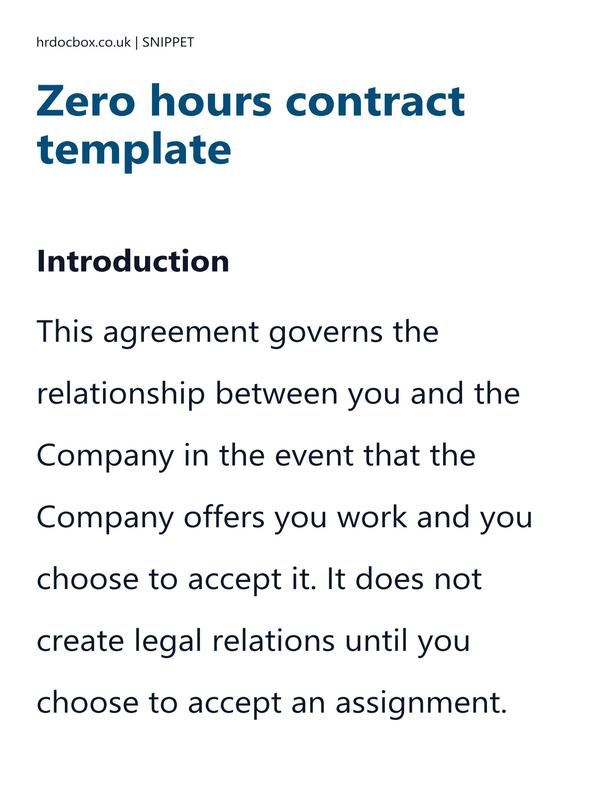Zero hours contract template


Our Zero Hours Contract template is a comprehensive solution, aiding in constructing flexible work agreements while upholding legal standards and mutual understanding.
- Includes 12 months' access to the Zero hours contract template, with all updates provided free of charge and notified to you.
- UK-specific accuracy.
- 1,348 words over 4 pages.
- Last updated 10/02/2025.
- Format: Word / plain text / email.
- Delivery: Instant download after purchase (no physical item).
- Access: Download link shown here after checkout.
- This Zero hours contract template will SAVE you up to 2 hours drafting & research, save you money, and reduce your risk.
1 Introduction
1.1 This agreement governs the relationship between you and the Company in the event that the Company offers you work and you choose to accept it. It does not create legal relations until you choose to accept an assignment.
2 Employment Status
2.1 Your engagement with [Company Name] is on a zero-hours basis, meaning there is no guarantee of minimum working hours. You will only be offered work as and when required, and you are under no obligation to accept any shifts offered.
2.2 This contract does not establish an employment relationship that provides continuous service. Your length of service is calculated only for periods where work has been undertaken.
Your employment status under this contract is that of a worker rather than an employee. This means you are entitled to certain statutory rights, including the National Minimum
This is a 10% preview of the Zero hours contract template. For instant full access, purchase this item or a parent bundle.
Zero hours contract template purpose
The Zero Hours Contract Template sets out the terms of engagement for workers with no guaranteed hours, ensuring clarity on rights, responsibilities, and flexibility for both parties. It includes provisions on pay, holiday entitlement, termination, and compliance with employment law.
This template helps employers maintain fair and transparent working arrangements while protecting workers' rights.
Practical application of a Zero hours contract template
- The Zero hours contract template should be actioned / delivered as soon as reasonably practical.
Compliance
Compliance
This Zero hours contract template incorporates relevant UK laws and HR standards, including those listed below:
-
Employment Rights Act 1996: Provides workers on zero-hours contracts with statutory rights, including the right to receive a written statement of terms.
-
Equality Act 2010: Ensures that zero-hours contract workers are not subjected to discrimination based on protected characteristics.
-
National Minimum Wage Act 1998: Requires employers to pay at least the national minimum wage for all hours worked under a zero-hours contract.
-
Working Time Regulations 1998: Grants zero-hours workers entitlement to rest breaks, holiday pay, and limits on working hours.
-
Best Practice: Clearly define terms regarding working hours, cancellation of shifts, and employment status to ensure transparency and fairness.
Timings
Timings
Follow these best practice actions to get the most from the Zero hours contract template, guiding you before, during, and after implementation:
Instantly unlock with a purchase.
Instantly unlock with a purchase.
| Step | Description | Responsibility | Timing |
| 1 | Identify the need for a zero-hours worker, ensuring the role aligns with business requirements and legal considerations (e.g., no obligation to offer work, worker rights). | Hiring Manager / HR | 1-2 weeks before recruitment |
| 2 | Advertise the role, conduct interviews, and complete pre-employment checks (e.g., right to work, references). Ensure candidates understand the nature of zero-hours work. | Hiring Manager / HR | 1-3 weeks before offer |
| 3 | Draft the Zero Hours Contract Template, including key terms (e.g., pay, availability expectations, cancellation policies, employment status). Ensure compliance with employment laws. | HR / Legal | Within 1 week of candidate selection |
| 4 | Issue the contract to the worker, provide time for review, and clarify key terms in an onboarding meeting (e.g., expectations around shift allocation, statutory entitlements). | HR | Immediately after drafting the contract |
| 5 | Maintain records, monitor working patterns, and periodically review contract usage to ensure fairness and compliance. Follow up with the worker to address any concerns. | HR / Line Manager | Initial check-in after 4 weeks, ongoing reviews every 6 months |
Frequently Asked Questions about a Zero hours contract template
Frequently Asked Questions about a Zero hours contract template
-
Can I use the Zero hours contract template in my small business?
Yes. The Zero hours contract template is designed to be flexible and suitable for organisations of all sizes, including small businesses and charities. It follows UK employment law best practice, so even if you don't have an in-house HR team, you can confidently apply it.
-
Is the Zero hours contract template compliant with 2026 UK employment law?
Absolutely. Like the Zero hours contract template, all of our templates are drafted with the latest ACAS guidance and UK employment legislation in mind. We review and update them regularly, so you can be confident they remain compliant.
-
Can I customise the Zero hours contract template for my organisation?
Yes, we highlight the areas of the Zero hours contract template that you need to update with your own details, and where you need to make decisions to suit your situation. This saves you time and ensures that you meet best practice.
-
Do I get instant access to the Zero hours contract template?
Yes. Once purchased, you'll be able to download the Zero hours contract template instantly. Templates are provided in editable Word or Excel format so you can customise them easily, and in PDF format for easy sharing.
-
What if I need more help, not just a Zero hours contract template?
If you're looking for broader support, we also offer toolkits and library bundles that include the Zero hours contract template, along with other HR templates and policies for fully managing your situation. These may be more cost-effective if you need deeper advice.
-
Why should I use this Zero hours contract template, and not AI to generate it?
The risk of using a free AI-generated template 'without review' includes your legal exposure, missing context, and no awareness of the wider process, whereas purchasing the Zero hours contract template from us mitigates that risk.
